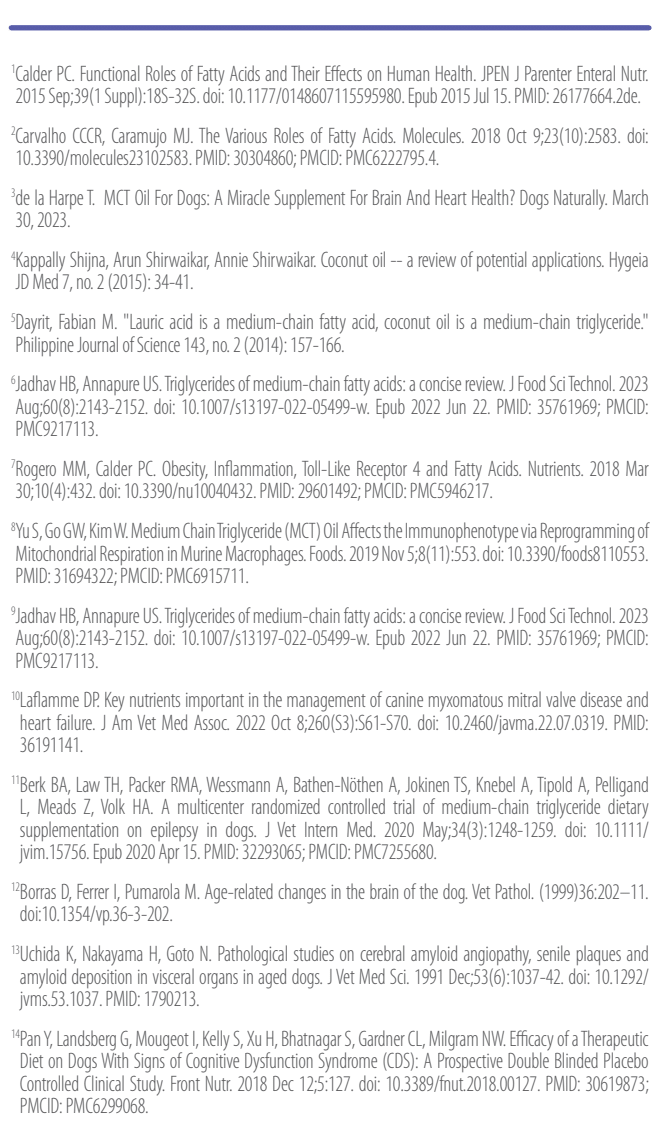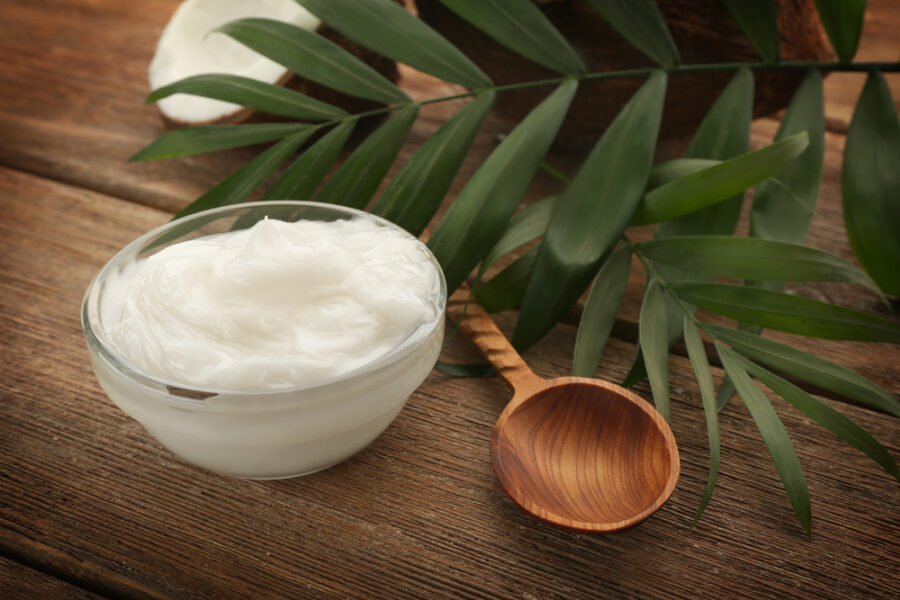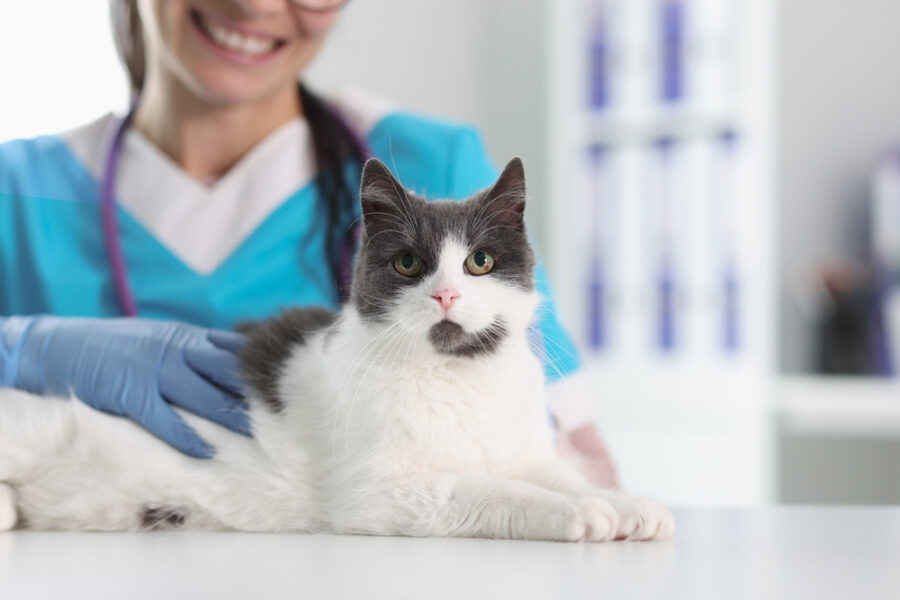Medium chain triglycerides (MCTs) can be used to help improve the health of animal patients with a variety of medical conditions from respiratory disease to seizures to canine cognitive disorder.
In todays world of human and animal health maintenance, discussions about fatty acids are commonplace. Most know about fatty acids from a strictly dietary standpoint; which ones are better to cook with and which provide the greatest health benefits when used within the diet. But besides their dietary advantages, what do we know about long chain fatty acids versus short and medium chain fatty acids? More specifically, what are the health benefits of medium chain triglycerides (MCTs) and why should we consider them for integrative health care approaches in companion animals?
WHAT ARE FATTY ACIDS?
Fatty acids are energy sources and membrane constituents. Their biological activities influence cell and tissue metabolism, function, and responsiveness to hormonal and other signals.1 More specifically, fatty acids have structural functions as constituents of phospholipids which are the building blocks of cell membranes; as part of neutral lipids, they serve as storage materials in cells, and their derivatives are involved in cell signaling.2
Numerous classification methods are used for determining the characteristics of a fatty acid and to what extent it would benefit the diet for both humans and animals. Chain length is one such important factor. Short chain fatty acids (SCFA) have fewer than six carbon atoms linked on a chain. Falling in the middle and the main focus of this article are the medium chain triglycerides (MCTs). These fatty acids have six to 12 carbon atoms linked on a chain. The longest of the group, the long chain triglycerides (LCTs), have more than 12 carbon atoms.3
COMPARING MCT OIL AND COCONUT OIL
Coconut oil is obtained from the kernel of harvested mature coconuts.4 There are three major forms refined coconut oil, copra oil and virgin coconut oil. The fatty acid profile of all three is the same, but some forms, in particular virgin coconut oil, contain a higher level of monoglycerides, diglycerides and other beneficial constituents, such as antioxidants.5
Coconut oil contains both long chain and medium chain fatty acids. Many of its properties can be accounted for by lauric acid, which makes up approximately half its fatty acids. Likewise, medium chain triglycerides that contain lauric acid account for approximately half of all triglycerides in coconut oil.5
Medium chain triglycerides (MCTs) contain medium chain fatty acids esterified to the glycerol backbone. This means all three positions on the glycerol backbone are occupied by medium chain fatty acids (MCFAs). These MCFAs have a shorter chain length and are quickly metabolized in the body, serving as an immediate energy source.6
Thanks to their physiological and functional characteristics, MCTs can help manage various health conditions. Most of these benefits appear to come from the capra fatty acids, which include caproic acid, caprylic acid, and capric acid. In fact, research has demonstrated that these MCTs help burn fat and reduce inflammation.3 In contrast, lauric acid has been shown to have pro-inflammatory effects.7
MCT OIL FOR RESPIRATORY CONDITIONS
Respiratory cases in our animal patients can be challenging. They can present as a simple runny nose but then progress to severe lung disease with catastrophic results. Respiratory disorders have many causes, and a barrage of conventional and integrative treatment options are available. Inflammation and infectious agents play a pivotal role in the development of these conditions.
MCT oil can be a beneficial tool in the treatment of respiratory conditions in companion animals, because it has anti-inflammatory and antibacterial properties. This can allow for improved respiration and easier breathing by reducing inflammation, mucus buildup, and decreasing cough and wheezing.
With chronic inflammation being at the root of so many diseases, it is important to have tools available to help reduce the inflammatory process in the patients body. MCT oil has been demonstrated to down-regulate the production of pro-inflammatory cytokines while elevating certain anti-inflammatory cytokines, thereby reducing inflammation.8
MCT oil has shown effectiveness against viral lung conditions such as SARS Coronavirus-2 by changing the metabolism of the viruss lipids. Viral replication relies on energy from long chain fatty acids, which also aid in attaching the viral envelope with the host cell. MCT oil interferes with this by decreasing the formation of long chain fatty acids, making them unavailable to the virus and leading to viral death.9
OTHER USES AND BENEFITS OF MCT OIL
1. Has anti-inflammatory properties
It is common knowledge that most disease processes occur due to chronic inflammation within the body. This chronic inflammation weakens the immune response and causes imbalances in the homeostatic mechanisms, thus allowing pathogens and disease to develop. Studies have demonstrated that MCT oil down-regulates the production of pro-inflammatory cytokines and elevates anti-inflammatory cytokines.8
2. Benefits heart health
Heart disease can have different clinical presentations with varying degrees of severity. According to an article published in 2022 by the Journal of the American Veterinary Medical Association (JAVMA), the most common cause of heart failure in dogs is myxomatous mitral valve disease (MMVD), accounting for 75% of canine heart disease.10 Dogs with heart disease can have decreased mitochondrial energy metabolism as well as increased inflammation and oxidative stress. Medium chain fatty acids and ketones derived from medium chain triglycerides provide an alternative energy source for cardiac mitochondria, and help reduce free radical production.10
3. Helps with seizures/epilepsy
Seizure disorders and epilepsy appear to be increasing within the pet population. There are many causes, from environmental factors and nutritional stressors to specific brain disorders. For years, conventional medications have been the mainstay of seizure treatment; however, drug-resistant epilepsy is becoming more commonplace. Additionally, clients wishing for a more integrative approach to managing seizure disorders are turning to alternative options. A study published in the Journal of Veterinary Internal Medicine discussed positive evidence for the use of MCT oil as a dietary supplement added to a stable base diet as a potential therapeutic management option for dogs with epilepsy.11
4. Supports brain health/slows canine cognitive disorder (CCD)
Canine cognitive disorder (also known as cognitive dysfunction syndrome or CDS) has become a common disorder in aging pets. It mimics human dementia and Alzheimers disease with similar neuropathological changes, including severe cortical atrophy, cerebral amyloid angiopathy, and ventricular enlargement.12,13 It is also important to note that as healthy humans and animals age, the brains ability to metabolize glucose changes. In human Alzheimers patients and animals with cognitive dysfunction, cerebral glucose metabolism is significantly decreased. The use of dietary MCT oil is able to improve learning, memory, and executive function in senior dogs.14
Dosing Recommendations for MCT Oil
- To avoid dietary upsets, slowly introduce MCT oil to the pet, especially if adding it to the diet.
- Dosing will vary based on age, weight, nutritional content of the current diet, health status, and disease process.
- Approximately 6% to 9% of a dogs diet can safely be composed of MCTs. This is why it is important to know the nutritional content of the diet, especially the total fat content.
- Sources indicate a good starting dose would be ¼ teaspoon per 10 pounds of body weight daily.
- Over time, this could be further broken down into more specific dosing guidelines:
- 10-20 pounds: ½ to 1 teaspoon per day
- 30-50 pounds: 1 to 2 teaspoons per day
- 60-100 pounds: 2 to 4 teaspoons per day
4 Types of Medium Chain Triglycerides (MCTs)
- Caproic acid: 6 carbon atoms
- Caprylic acid: 8 carbon atoms
- Capric acid: 10 carbon atoms
- Lauric acid: 12 carbon atoms
IN SUMMARY
MCT oil has shown amazing benefits for improving the health of animal patients with a variety of medical conditions. Its ease of administration along with its versatility make it an excellent addition to integrative veterinary practice.









